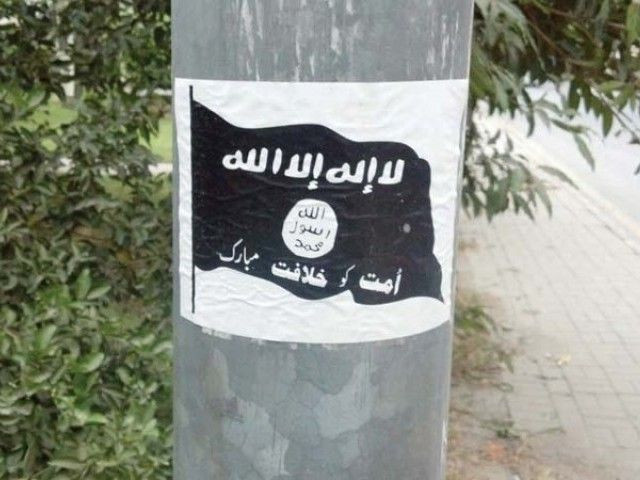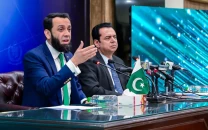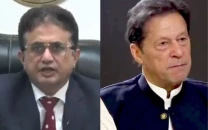Da’ish an emerging threat to Pakistan, says IB chief
Aftab Sultan says there are reports of fighters recruited by sectarian outfits being sent to Syria

Says current wave of terror will take 10 years to subside. PHOTO: MUHAMMAD UMAIR/EXPRESS
For the first time, the government has officially admitted the ultraorthodox terrorist outfit Islamic State (IS) or Da’ish is an emerging threat in the county and that the prevailing wave of terrorism will continue and take at least 10 years to subside.
“There is an emerging trend that the terrorist groups are reorganising while Da’ish is an emerging threat to the country,” the Intelligence Bureau’s (IB) Director General Aftab Sultan informed the Senate’s Standing Committee on Interior and Narcotics Control on Wednesday.
Around 100 Pakistanis left for Syria, Iraq to join Da’ish: Punjab law minister
The top civilian intelligence agency’s boss testified that some banned outfits –Lashkar-e-Jhangvi (LeJ) and Sipah-e-Sahaba Pakistan – were reorganising themselves while the presence of Dai’sh was getting more prominent than before. The IB chief said all local militant groups including the LeJ and the SSP had a soft corner for Da’ish.
“We recently unearthed a network of Da’ish and there are reports of fighters being recruited by sectarian and other outfits, and being sent to Syria,” he said, adding that the number of people leaving Pakistan for Syria to join Da’ish was in their hundreds.
Sultan said the outlawed Tehreek-e-Taliban Pakistan (TTP) coordinated with Da’ish despite the rivalry of the Afghan Taliban with the Middle-eastern terror group in Afghanistan. “The group [Da’ish] is using social media and cyberspace extensively to recruit and communicate messages of suspected militants,” he said.
The DG claimed that the TTP was behind major terror incidents in the country. “The TTP is realigning itself with the LeJ and the SSP,” he said, adding, “There is a small presence of al Qaeda sub-continent branch in Karachi as it has been found involved in the killing of some police officers there.”

The IB boss told the committee that the TTP Fazlullah group was still the strongest one and all militant groups were working in tandem. “Jandullah is a smaller group,” he said. “The IB is identifying signs of the militants’ presence in the country and carrying out arrests where necessary,” he said.
Assistants of terror: How women raise funds for Da’ish in Karachi
Spy signals
Earlier, the IB chief gave an in-camera briefing to the Senate panel about the measures taken to counter ‘spy signals’ that might target the Prime Minister’s Secretariat and other sensitive buildings in its vicinity.
In June last year, Sultan told the same committee that a high-level meeting at the PM House was called off in 2012 after officials informed that the session was being snooped through ‘spy signals’ emanating from the Diplomatic Enclave.
Sources, who attended the in-camera briefing, told The Express Tribune that the DG refused to identify any specific diplomatic mission involved in snooping. However, he admitted that there were multiple laser beams identified in the PM house but they could not trace them to their origin.
Military offensive
Sultan claimed that the terror incidents have considerably decreased after the launch of operation Zarb-e-Azb. “Terrorists are on the run. Civilian security and intelligence setups are augmenting and implementing operation Zarb-e-Azb in cities.”
Govt ‘importing’ Islamic State fighters to undermine Zarb-e-Azb: Qadri
He, however, maintained that terror incidents cannot be completely averted in the country till next 10 years. “The current spate of terrorism will continue and we have to be alert to counter it,” he said.
Senator Ali Khan Saif, however, disagreed with the idea of ‘the terrorists on the run’. “They were obviously to leave the place when military launched offensive against them,” he said. “It is not a success as the terrorist activities are increasing,” he said.
The IB chief said the bureau had arrested the accused involved in attacks on Justice Maqbool Baqar, Khalid Mehmood Soomro, SSP Chaudhry Aslam and Bashir Bilour as well as the attackers of Shikarpur Imambargah.
Published in The Express Tribune, February 11th, 2016.



















COMMENTS
Comments are moderated and generally will be posted if they are on-topic and not abusive.
For more information, please see our Comments FAQ